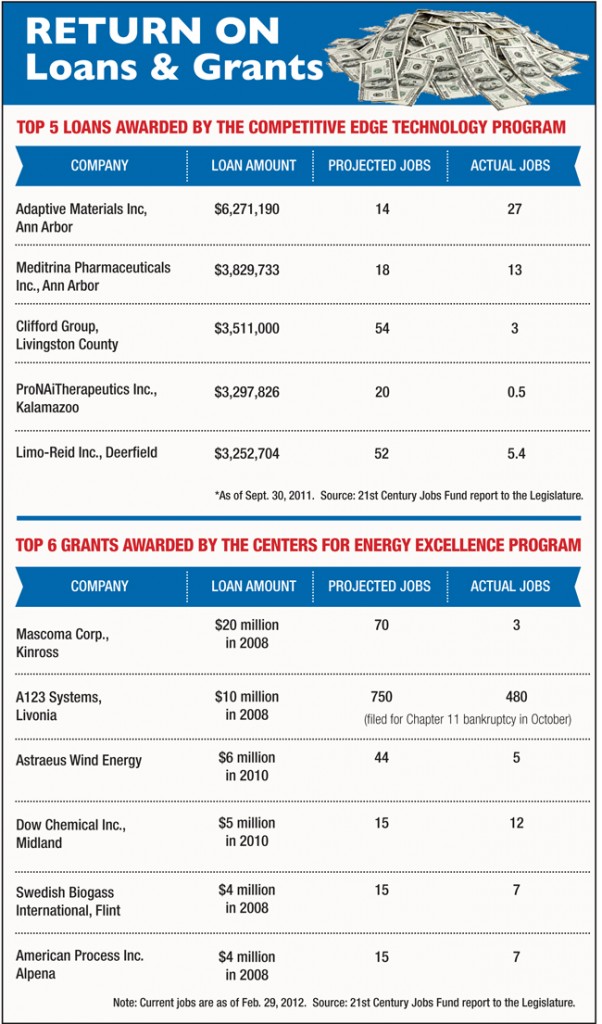Governors run after companies, waving dollars
Governors can’t resist using their economic development agencies to try to pick business winners and losers in the economy, even when they say they are opposed to doing so.
Gov. James Blanchard bankrolled efforts to grow biotechnology and advanced manufacturing industries in the state, with mixed results.
His successor, Gov. John Engler, heavily invested in life sciences and placed a losing side bet on Michigan becoming a center of flat video screen manufacturing.
Gov. Jennifer Granholm was all about turning Michigan into the nation’s capital for manufacturing electric car batteries, wind turbines and solar panels. It’s far from clear that the billions invested in those industries will pay off.
Granholm’s successor, Gov. Rick Snyder, says he is focused on improving Michigan’s business climate and lowering costs for all industry segments.
But Snyder is showing a preference for aiding technology and agribusiness companies in the 21st Century Jobs Fund, a 10-year, $1 billion program Granholm used to try to boost the advanced manufacturing, clean energy, homeland security and life sciences industries.
Snyder signed legislation last year that specifically expands eligibility for financing and other Jobs Fund assistance to the information technology and agricultural processing industries.
"If you look at history, Michigan's most rapid periods of job growth came when we were a leader of technology and innovation," Snyder said in signing the legislation.
The governor, who ran computer-maker Gateway and an Ann Arbor venture capital fund before being elected governor in 2010, also has often spoken about the importance of the state’s agriculture industry.
Snyder has said agriculture contributes more than $71 billion annually to Michigan’s economy; is a major exporting industry; and “plays a key role in the growth and reinvention of our economy.”
Cherry Growers Inc., a member-owned apple and cherry products processor near Traverse City, in July received a $2.5 million state cash incentive to expand operations and add 72 jobs.
That was the second-largest incentive granted so far by the Michigan Business Development Program, which earlier this year replaced the Michigan Economic Growth Authority tax credits as the state’s major incentive program.
Snyder changes rules for dollars
The Snyder administration also has loosened some of the requirements for receiving state incentives.
Under MEGA, the state used an econometric model to determine the size of the incentive.
The model took into consideration such things as the number of jobs proposed, the size of the investment and how it would take the state to recover the incentive through increased economic activity.
Companies did not receive credits unless they created the minimum number of jobs required in the incentive agreement.
MEDC officials say they use similar criteria in awarding incentives under the Michigan Business Development Program. Those incentives usually involve up-front cash, but can also be loans or other assistance.
The new program is more individually tailored to the needs of companies seeking them, officials say.
“While the MEGA tax credit was evaluated based on providing tax savings (for a company), incentives under this program are provided when needed for deal closing or gap financing,” said Joshua Hundt, the MEDC’s manager of development finance.
Deal-closing funds have become popular incentive tools at many state economic development agencies. But they also can result in costly and drawn-out efforts to recoup the money -- known as “clawbacks”-- when companies getting state cash fail to produce promised jobs.
Legislation establishing the Michigan Business Development Program requires repayment of the incentive if the minimum number of jobs, usually 50, aren’t created by the project.
Rick Haglund has had a distinguished career covering Michigan business, economics and government at newspapers throughout the state. Most recently, at Booth Newspapers he wrote a statewide business column and was one of only three such columnists in Michigan. He also covered the auto industry and Michigan’s economy extensively.
Business Watch
Covering the intersection of business and policy, and informing Michigan employers and workers on the long road back from coronavirus.
- About Business Watch
- Subscribe
- Share tips and questions with Bridge Business Editor Paula Gardner
Thanks to our Business Watch sponsors.
Support Bridge's nonprofit civic journalism. Donate today.
See what new members are saying about why they donated to Bridge Michigan:
- “In order for this information to be accurate and unbiased it must be underwritten by its readers, not by special interests.” - Larry S.
- “Not many other media sources report on the topics Bridge does.” - Susan B.
- “Your journalism is outstanding and rare these days.” - Mark S.
If you want to ensure the future of nonpartisan, nonprofit Michigan journalism, please become a member today. You, too, will be asked why you donated and maybe we'll feature your quote next time!


